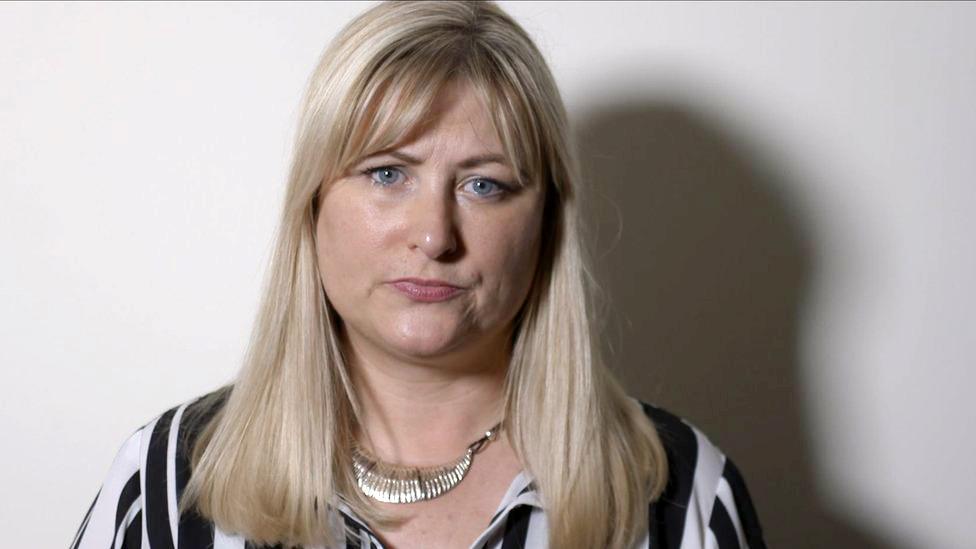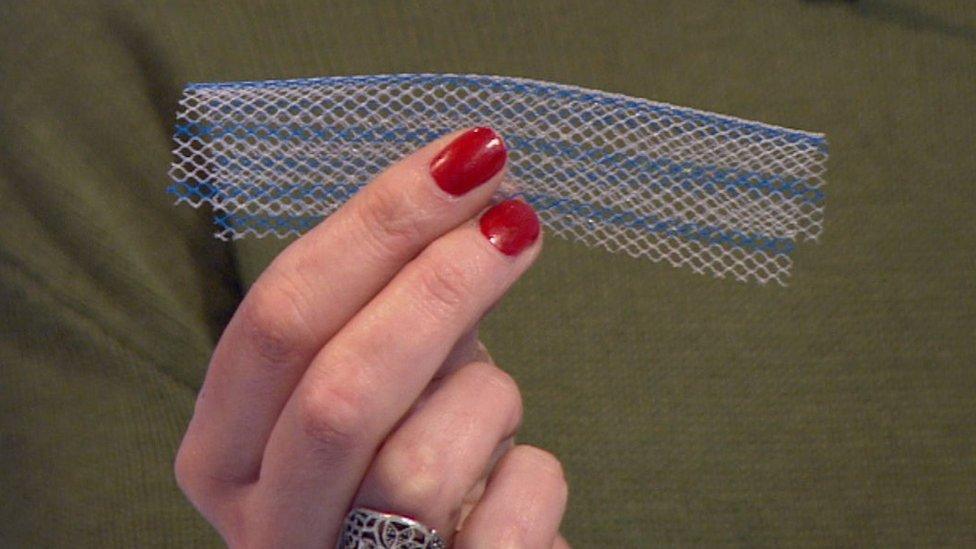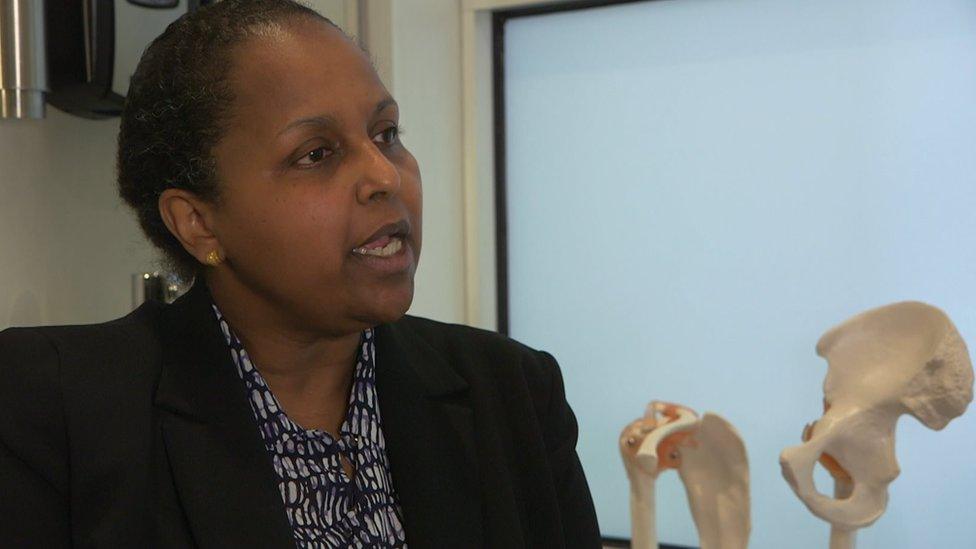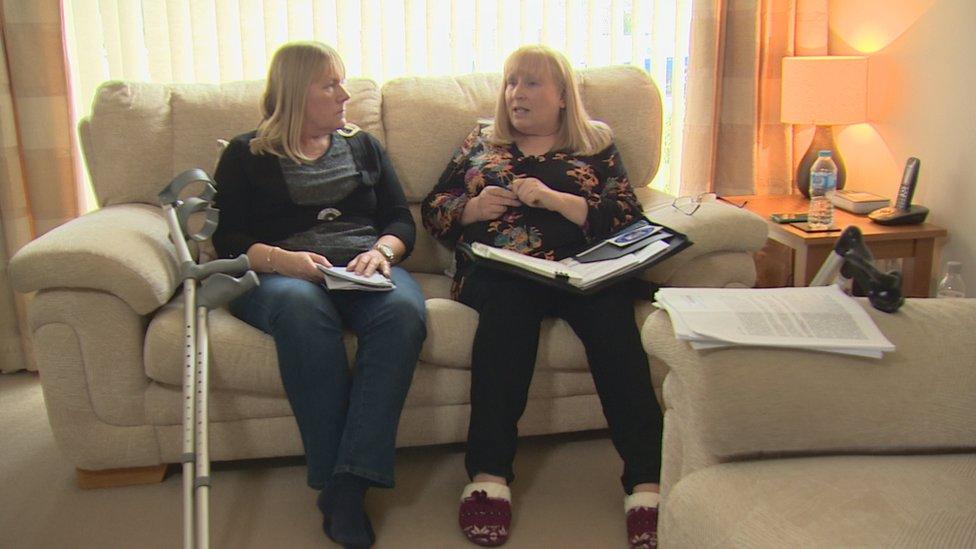Vaginal mesh implants: Hundreds sue NHS over 'barbaric' treatment
- Published

Kate Langley has been left in permanent pain by her vaginal mesh implant
More than 800 UK women are taking legal action against the NHS and the makers of vaginal mesh implants, the Victoria Derbyshire programme has learned.
The implants are used to treat pelvic organ prolapse and incontinence after childbirth, but some can cut into the vagina - causing severe discomfort.
Some women have been left in permanent pain, unable to walk, work or have sex. One called the implants "barbaric".
The UK's medicines regulator said it "sympathises" with the women affected.
Kate Langley had to give up her business as a childminder because the pain was so intense she could not look after the children.
The surgeon who first examined her, she explained, "could see the [mesh] tape had come through my vagina - protruding through.
"The mesh had cut its way through - like a cheese-wire," she told the Victoria Derbyshire programme.

The mesh implants are used to ease incontinence and to support organs
Other women, reporting similar symptoms, have said the perforation was so severe their partners had been injured by the mesh during sex.
Ms Langley, who described the meshes as "barbaric", said she has had 53 hospital admissions to try to end the pain, but - like many women - the mesh was so near the nerve it could not be fully removed.
She has been left in permanent pain by the implants and has nerve damage.
What's the issue with mesh implants?
Mesh implants 'as dangerous as asbestos'
Faulty implants end women's sex life
The plastic meshes are made of polypropylene - the same material used to make certain drinks bottles - and manufactured by many different companies.
They are used to ease incontinence and to support organs such as the vagina, uterus, bowel, bladder or urethra which have prolapsed after childbirth.
Claire Cooper began to experience pain three years after her operation.
Doctors wrongly believed the source of discomfort was her womb, which she had had removed at the age of 39.
When the pain continued, she said a GP told her she was imagining it.
Claire Cooper has been left unable to have sex because of the pain
The news made her want to take her own life. She said she "mapped out" her suicide, but wanted to live on for her children.
She still lives in pain and said her husband has "turned into my carer".
"We haven't had sex for four-and-a-half years. This stuff breaks up marriages.
"I wouldn't at all be surprised if there are mesh-injured women that have taken their own lives and didn't know what the problem was," she said.
Ms Cooper is one of a number of women calling for the NHS to stop fitting the implants.
"I want the procedure banned, I want the material banned," she said.
Labour MP Owen Smith, who is planning to hold a Parliamentary debate on the issue, called for an investigation into the use of vaginal mesh.
He told the BBC: "I think there is a really good case for saying 'suspend its usage' until there is clarity about the scale of the problems we're facing."
Unaware of risks
Between April 2007 and March 2015, more than 92,000 women had vaginal mesh implants in England, according to NHS data from the Hospital Episodes Statistics, obtained by the Victoria Derbyshire programme.
That figure includes a number of different types of implant, including TVT (trans-vaginal tape), TOT (transobturator tape), and SS tape, which is a suprapubic sling.
About one in 11 women has experienced problems, the data suggests.
Now, more than 800 women in the UK are taking legal action against the NHS and manufacturers, including US pharmaceutical giant Johnson & Johnson - the biggest makers of mesh implants.
Its subsidiary, Ethicon, said it was "vigorously defending litigation".
Many of the women the BBC met said they had never been told by their surgeons about the potential risks associated with the implants.
The Medicines and Healthcare products Regulatory Agency (MHRA) says for the majority of women, the use of vaginal mesh implants is safe and effective.
The meshes are still prescribed on the NHS across the UK, although a recent review in Scotland said they should not be routinely used for pelvic organ prolapse.
Experts believe if the women are successful in their legal case, the NHS payout for compensation could be tens of millions of pounds.
In the US, thousands of women have sued manufacturers, receiving payouts that total several billion dollars.

Dr Sohier Elneil removes meshes from women if they are suffering complications
Consultant urogynaecologist Dr Sohier Elneil said she sees patients in the UK who have been left facing severe pain and unable to walk.
"The typical type of patient I see is a patient who is incapacitated by severe pain of a chronic nature. Often they are on high-dose medication, including opiates.
"They become so incapacitated that many of them are either walking by crutches or sitting in wheelchairs and perhaps more dramatically so, they become unable to look after their families."
Currently in the UK, there are around 100 types of vaginal mesh implants.
So far, not one model has been recalled in the UK.
According to one expert, Prof Carl Heneghan, manufacturers have to provide little evidence before their product is clinically approved and made available on the NHS.
"The regulatory body... doesn't even look at the device," he said.

Prof Heneghan says it is easy for manufacturers to get mesh implants approved
Prof Heneghan also said manufacturers just have to provide documents that show their vaginal mesh implant is similar to one already on the market and it is highly likely to be approved.
One leaked email from Johnson & Johnson suggested it had known problems existed with one of its products since 2004.
The email said the company needed to start a "major damage control offensive" because "the competition will have a field day".
The manufacturers said highlighting this email in isolation was "extremely misleading".


An MHRA spokesman said it was "committed to help address the serious concerns raised by some patients".
It added: "The greater proportion of the clinical community and patients support the use of these devices in the UK."
Ethicon said "these devices have helped millions of women".
It said it had "acted appropriately and responsibly in the research, development and marketing of its pelvic mesh products".
21 April 2017: This article was updated with data from NHS Digital about the number of women who have had implants fitted.
Watch the Victoria Derbyshire programme on weekdays between 09:00 and 11:00 on BBC Two and the BBC News Channel.
- Published19 December 2016

- Published21 December 2016

- Published5 March 2017
